When I was a boy, maybe eight or nine years old, I
had two favourite books, books which I had chosen to read for myself rather
than having been told to read them by grown-ups. The first one was My Side
of the Mountain by Jean Craighead George, which is the story of Sam
Gribley, an American teenager who goes to live in the Catskill mountains,
surviving on what he can forage and hunt, and living in a hollowed out hemlock
tree. I loved this book and virtually memorised it; I wanted to be Sam and live
inside a tree but I knew my mum wouldn’t let me (after all, I was only eight or nine).
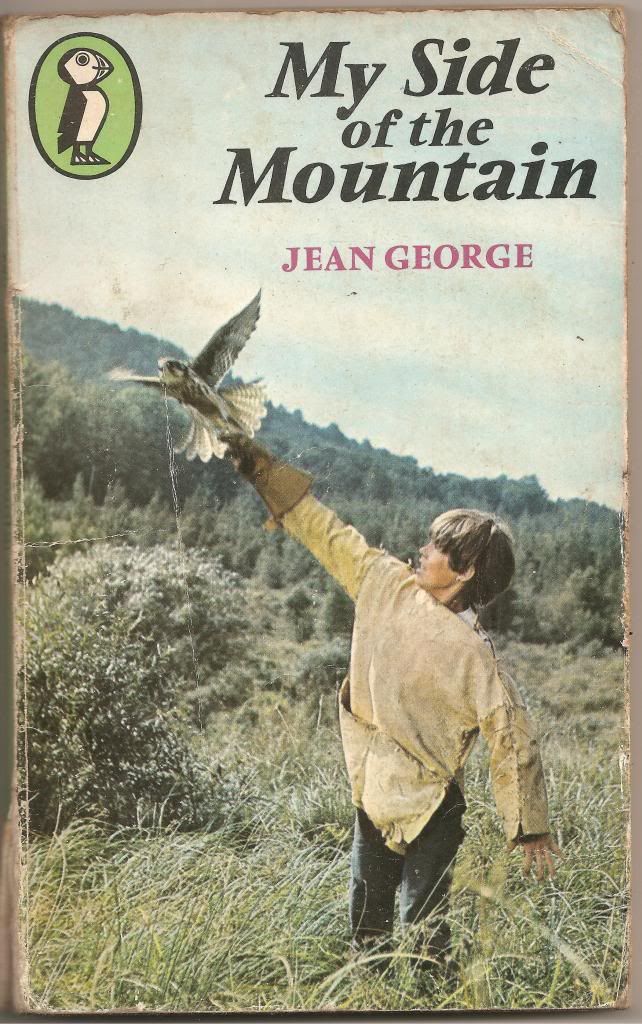 |
| Jean George - My Side of the Mountain |
So, I decided I would get as
close to it as I could. I learned all the skills that Sam had had to learn; I
could make fire in at least half a dozen different ways, I learned which
berries were safe to eat and which should be avoided, I learned the
constellations in the night sky and how to navigate by the stars. But Sam had
one thing that I could never have – a trained peregrine falcon. If you lived in
a two-up-and-two-down in Mill Hill, Blackburn during the sixties, you would
never get to have a falcon of your own. But that didn’t stop me learning about them.
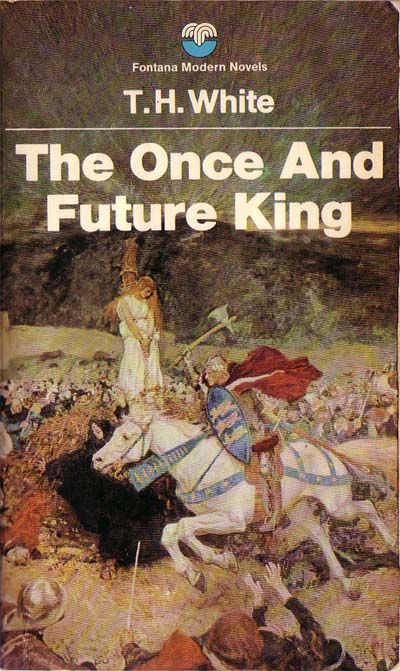 |
| T H White - The Once and Future King |
Which brings me to the second book. I was taken to see the Disney film The
Sword in the Stone at the local fleapit and I was fascinated by it. Wart
(who would grow up to be King Arthur) learned about the natural world by actually becoming the creatures themselves,
courtesy of Merlin’s magic. And, there was a book from which the film had been
made, T H White’s tetralogy The Once and Future King. The first part, The
Sword in the Stone, was brilliant, if a little hard going, and the later
themes and language in The Queen of Air and Darkness, The Ill-Made Knight
and The Candle in the Wind were maybe a little too adult for a nine year
old although it was still a marvellous book.
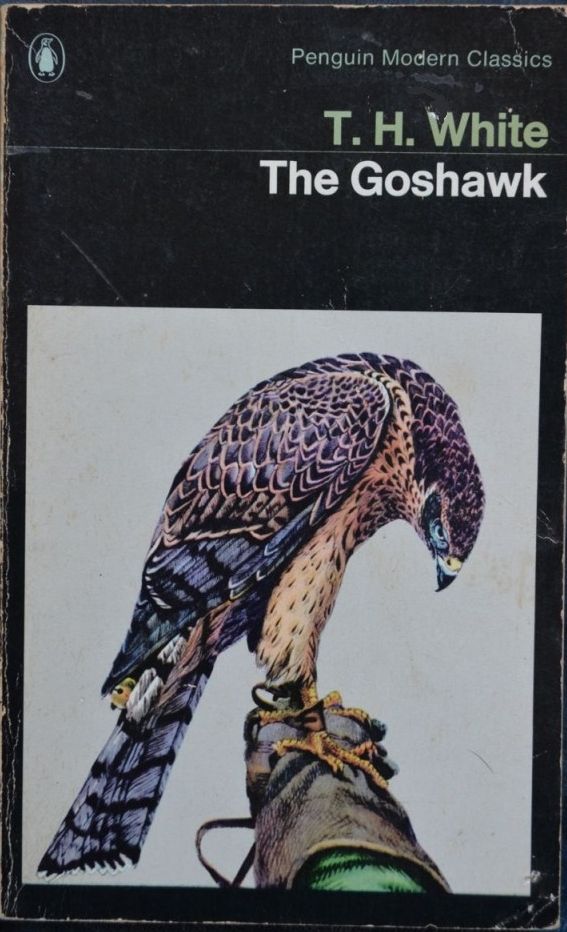 |
| T H White - The Goshawk |
It led me to another of White’s books,
The Goshawk, which attracted me because it was also by White but it was
also about falcons, which made it a winner on both counts. It is an account of
how White trained the eponymous goshawk in the way of the old-style,
traditional falconers, sitting up with the bird on his fist for days and nights
on end until the wild creature was so tired that it had no other choice but to
put its trust in the man and fall asleep.
The two beings, man and bird, learn
from each other and become almost a single entity, tied by trust and respect.
It is a grown-up book, with many, many layers, and the nine-year-old me learned
from it that books didn’t always just have to tell stories. One of the most
fascinating parts of White’s narrative is the language of the falconers, and I
also learned that some of our common words and expressions came from totally
unexpected fields.
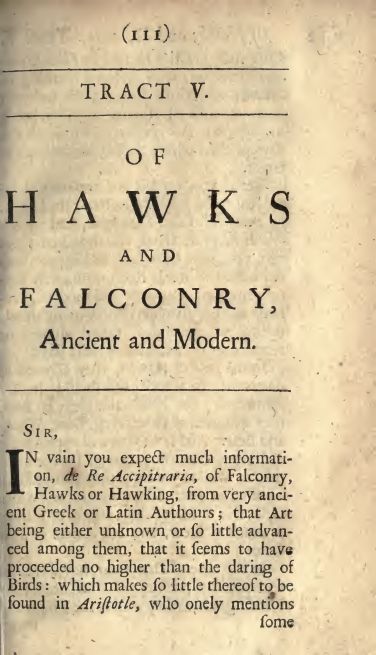 |
| Sir Thomas Browne - Of Hawks and Falconry - 1684 |
Take, for instance, the word ‘bate’ – when a bird
in the hand becomes frustrated, surprised, angry or bored, it will attempt
to fly off the fist but, because it is restrained by leashes around its legs
(the jesses), it will hang upside down, beating its wings furiously –
the bird is said to ‘bate’. If one gets oneself into a fury or panic you are said to
get ‘into a bate’. You don’t really hear it too much these days,
although I have heard it used in this sense; Shakespeare uses in The
Taming of the Shrew,
“These kites that bate and beat and will not be obedient.”
It is related to words like beat, batter and battle, and goes
back to at least 1398 – it is used in Trevisa’s translation of Bartholomeus
Anglicus’ De Proprietatibus Rerum (On the Properties of Things),
“Also the eyen [eyes] of such birds should oft be seled and closed, or hid, that she bate not too oft from his hand that beareth her.”
To be confined,
so as to prevent bating, is to be abated, and we use this meaning
when we hold our breath in anticipation – we wait with bated breath (and
not, as some may write, baited breath, which is simply nonsense).
Another way of keeping hawks and falcons calm and quiet is to cover their eyes,
as this prevents them from seeing anything that might alarm them and cause them
to bate.
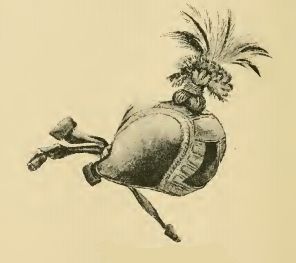 |
| Hood |
The universal method of doing this is to place a hood, usually made
from leather and often decorated, over the bird’s head and eyes. Thus, the bird
is hoodwinked – it is deceived into thinking all is well.
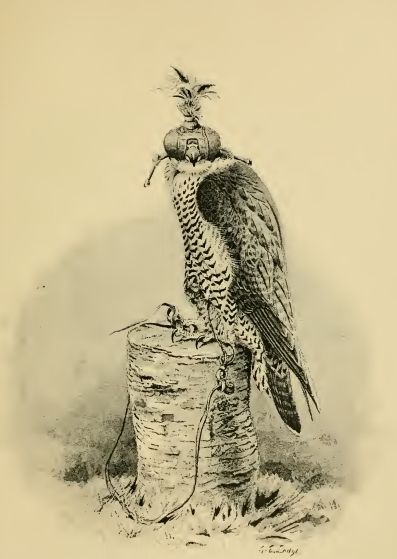 |
| A Hoodwinked Peregrine |
From the same
idea of keeping the bird safe by covering its eyes with a hood, and derived
from the diminutive of the French chape – a hood or cape – comes the
word chaperon, an older person who accompanies a younger person to keep
them from harm (as a chaperon usually attends a young woman, and is often an
older woman, the English, incorrectly, add an unnecessary feminising ‘e’ at the
end, spelling it as chaperone).
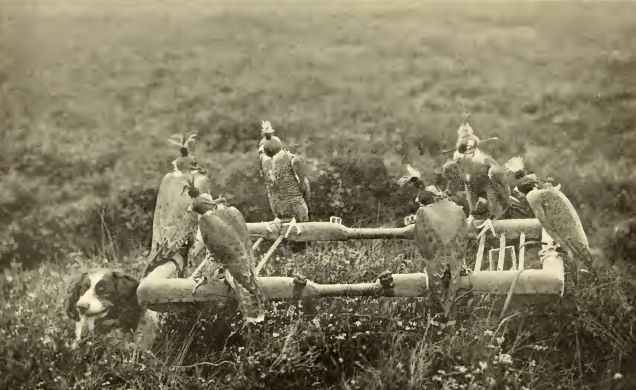 |
| Hooded (and chaperoned by a spaniel). |
Hawks and falcons were kept in special
houses, where they were allowed to moult– muer in French - in safety,
and these came to be known as mews; you’ll sometimes see rows of
cottages called Something-or-other Mews (usually in the more
aspirational, gentrified parts of town).
 |
| Jesses |
The leashes, the jesses, that
are fastened around the legs of a bird to stop it from flying away are firmly
held in the falconer’s fist on which the bird sits. The jesses are gripped
tightly between the thumb and the palm of the hand – they are ‘under the
thumb’ – and just to be on the safe side, to make sure that bird is totally
under control, the jesses might be ‘wrapped around your little finger.’
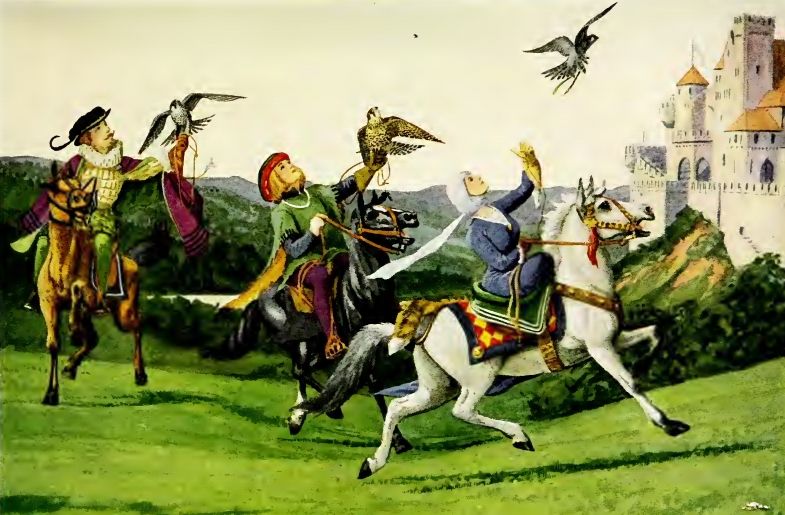 |
| Hunting with Hawks |
For hawks and falcons to hunt efficiently, they need to be hungry but if given
half a chance a bird will eat as much meat as it can, filling up its crop, the
pouch in which birds start to digest their food, which are covered in feathers
called the gorget (which, incidentally, is where the name for throat
armour derives) and hence a bird which eats too much is said to gorge
itself.
And if a bird does gorge itself, it is pointless taking the
thing out to hunt with, as it is too full to be bothered chasing anything. It’s
best to leave it in the mews, where it will become bored and won’t want to do
anything – and that is because it is fed-up.
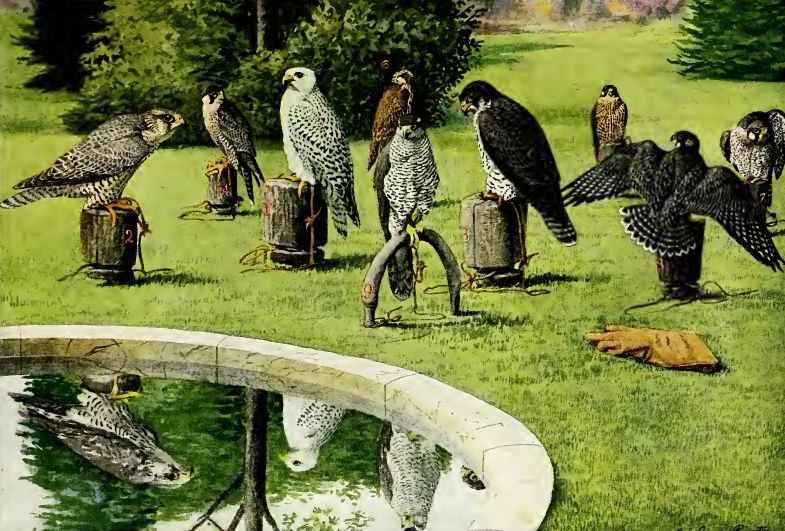 |
| Roused and Ready |
However, if your falcon has
not gorged itself and it is ready for work, it will wake up, stretch and shake
its feathers, it will rouse itself, a word now generally used to wake
oneself up. If your falcon rouses itself and makes a kill, it will bring
it to the ground and stretch its wings over the prey, hiding it as it tries to
eat it – it is said to mantle its wings and this sort of covering finds
its way into everyday language in such words as mantelpiece, the
covering on a chimney.
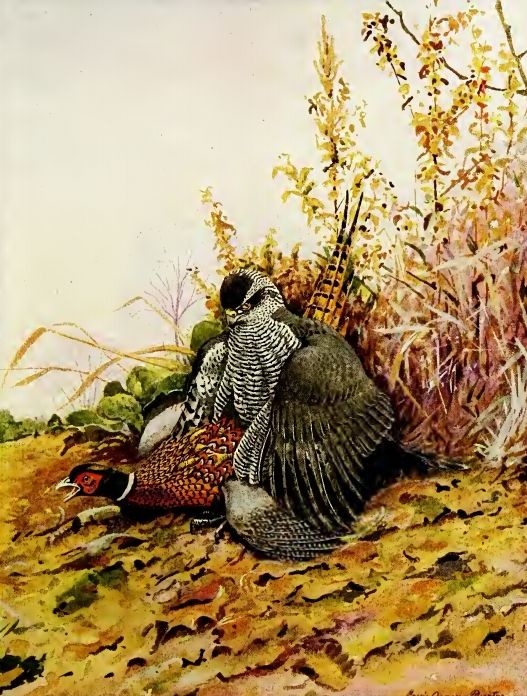 |
| Goshawk mantles a pheasant |
Young birds that are trained as hunting birds are raised
from captive breeding stock and young birds that lack feathers and are bald are
described as ‘callow’, a word that we now apply to any young and
inexperienced youth.
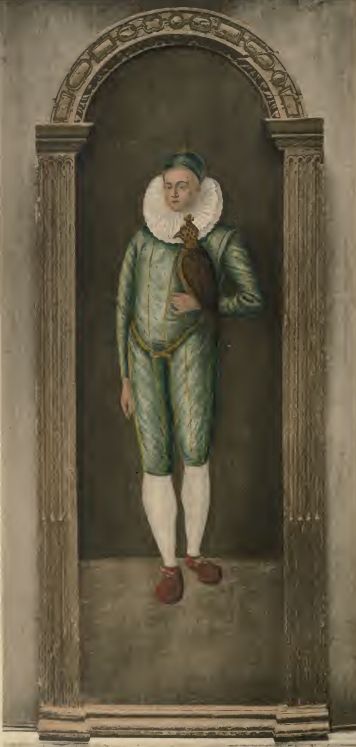 |
| A Callow Youth |
But if an adult bird is taken from the wild, captured and
trained after it has had some experience in the great, wide world outside, it
was easier to catch them at the end of their migrations, when they were gaunt,
tired and bedraggled, when they were haggard.
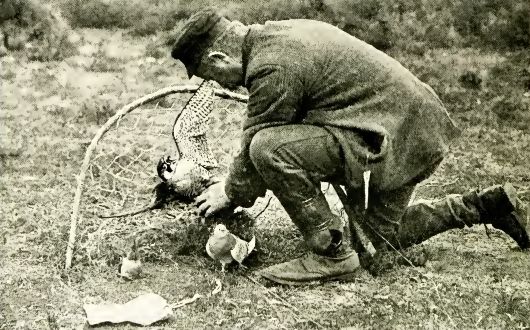 |
| Catching a haggard peregrine |
When falconers themselves
became old and haggard, they were quite often given menial duties to perform,
leaving the harder work to younger men. One of these jobs was to carry the
perches on which the falcons sat to the hunting field; these perches were
called cadges, and the men who carried them were called cadgers,
the word coming to mean someone who begs or cadges, as the position was
poorly or unpaid and the cadger would cadge what little money
they could manage to get.
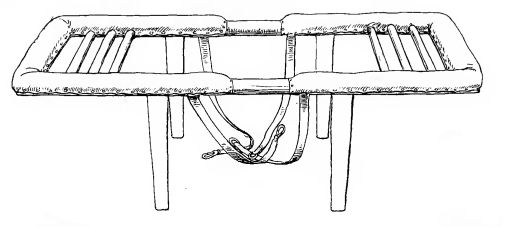 |
| A Cadge |
Over time, the word passed on to mean any old man in
general – they were old codgers. There are other words and phrases that
have their origins in falconry, but I think that’s enough for one day and I
will go away now or, to use one final term from the field, I shall turn tail.
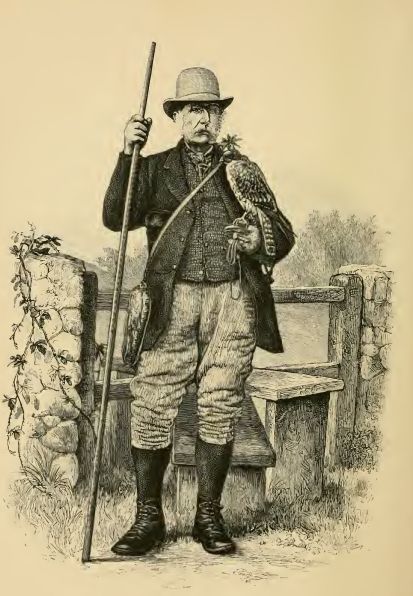 |
| A Codger ? |
No comments:
Post a Comment